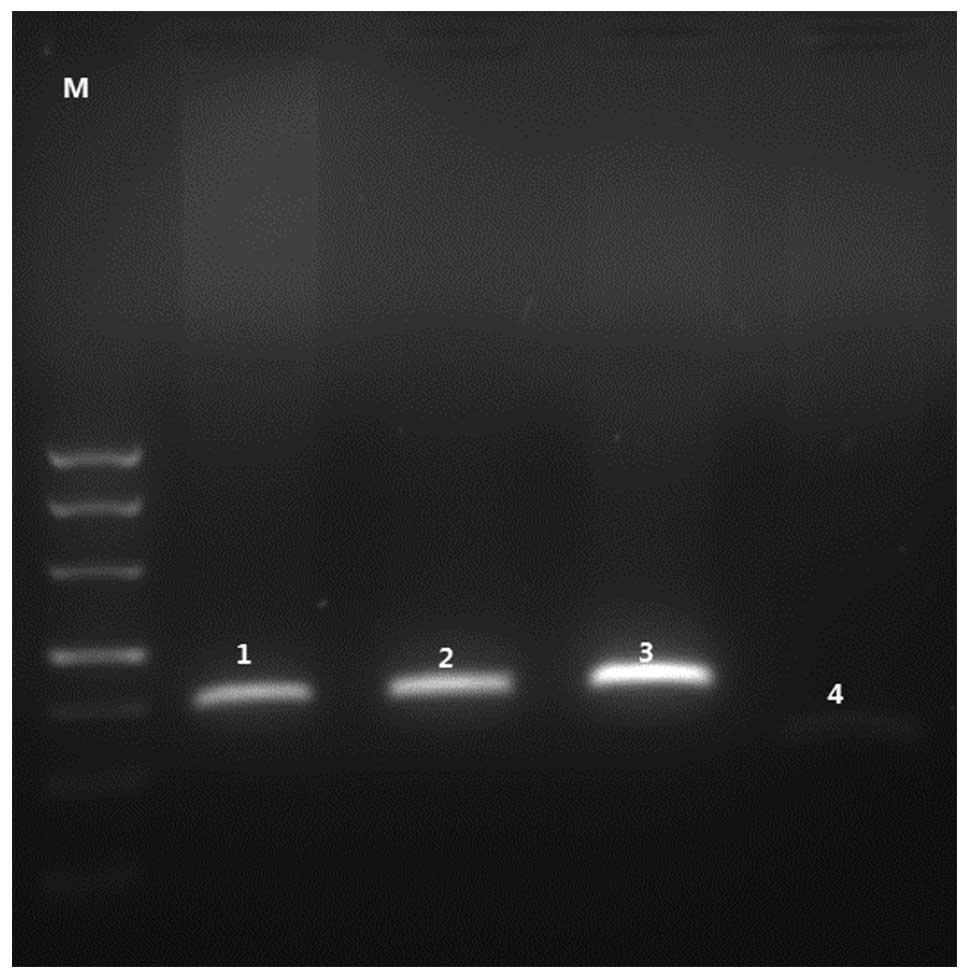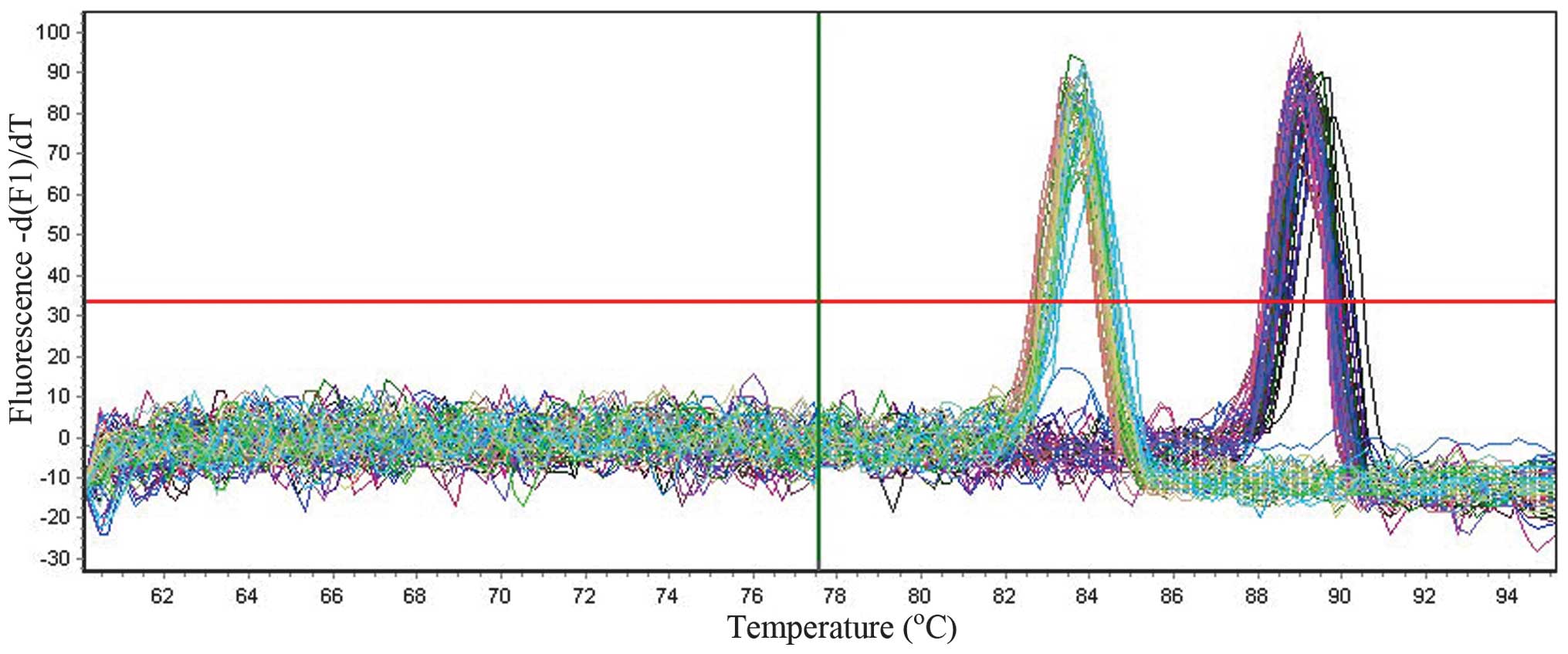|
1
|
Jemal A, Siegel R, Ward E, et al: Cancer
statistics, 2008. CA Cancer J Clin. 58:71–96. 2008. View Article : Google Scholar : PubMed/NCBI
|
|
2
|
Jemal A, Murray T, Ward E, et al: Cancer
statistics, 2005. CA Cancer J Clin. 55:10–30. 2005. View Article : Google Scholar : PubMed/NCBI
|
|
3
|
Corral R, Lewinger JP, Van Den Berg D, et
al: Comprehensive analyses of DNA repair pathways, smoking, and
bladder cancer risk in Los Angeles and Shanghai. Int J Cancer.
135:335–347. 2014. View Article : Google Scholar : PubMed/NCBI
|
|
4
|
Wu X, Ye Y, Kiemeney LA, et al: Genetic
variation in the prostate stem cell antigen gene PSCA confers
susceptibility to urinary bladder cancer. Nat Genet. 41:991–995.
2009. View
Article : Google Scholar : PubMed/NCBI
|
|
5
|
Ma Z, Hu Q, Chen Z, et al: Systematic
evaluation of bladder cancer risk-associated single-nucleotide
polymorphisms in a Chinese population. Mol Carcinog. 52:916–921.
2013. View
Article : Google Scholar
|
|
6
|
Elsamman E, Fukumori T, Kasai T, et al:
Prostate stem cell antigen predicts tumour recurrence in
superficial transitional cell carcinoma of the urinary bladder. BJU
Int. 97:1202–1207. 2006. View Article : Google Scholar : PubMed/NCBI
|
|
7
|
Yang X, Guo Z, Liu Y, et al: Prostate stem
cell antigen and cancer risk, mechanisms and therapeutic
implications. Expert Rev Anticancer Ther. 14:31–37. 2014.
View Article : Google Scholar
|
|
8
|
Marra E, Uva P, Viti V, et al: Growth
delay of human bladder cancer cells by Prostate Stem Cell Antigen
downregulation is associated with activation of immune signaling
pathways. BMC Cancer. 10:1292010. View Article : Google Scholar : PubMed/NCBI
|
|
9
|
Saeki N, Gu J, Yoshida T and Wu X:
Prostate stem cell antigen: a Jekyll and Hyde molecule? Clin Cancer
Res. 16:3533–3538. 2010. View Article : Google Scholar : PubMed/NCBI
|
|
10
|
Lam JS, Yamashiro J, Shintaku IP, et al:
Prostate stem cell antigen is overexpressed in prostate cancer
metastases. Clin Cancer Res. 11:2591–2596. 2005. View Article : Google Scholar : PubMed/NCBI
|
|
11
|
Cheng F, Yu W, Zhang X and Ruan Y:
Quantum-dot-based technology for sensitive and stable detection of
prostate stem cell antigen expression in human transitional cell
carcinoma. Int J Biol Markers. 24:271–276. 2009.
|
|
12
|
Study Group of Millennium Genome Project
for Cancer. Sakamoto H, Yoshimura K, Saeki N, et al: Genetic
variation in PSCA is associated with susceptibility to diffuse-type
gastric cancer. Nat Genet. 40:730–740. 2008. View Article : Google Scholar : PubMed/NCBI
|
|
13
|
Fu YP, Kohaar I, Rothman N, et al: Common
genetic variants in the PSCA gene influence gene expression and
bladder cancer risk. Proc Natl Acad Sci USA. 109:4974–4979. 2012.
View Article : Google Scholar : PubMed/NCBI
|
|
14
|
Sobin LH, Gospodariwicz M and Wittekind C:
TNM Classification of Malignant Tumors. UICC International Union
Against Cancer. 7th edition. Wiley-Blackwell; Hoboken, NJ: pp.
262–265. 2005
|
|
15
|
Sauter G, Algaba F, Amin M, et al: Tumours
of the urinary system: non-invasive urothelial neoplasias. WHO
Classification of Tumours: Pathology and Genetics of Tumours of the
Urinary System and Male Genital Organs. Eble JN, Sauter G, Epstein
JI and Sesterhenn I: IARCC Press; Lyon: 2004
|
|
16
|
Chini V, Foka A, Dimitracopoulos G and
Spiliopoulou I: Absolute and relative real-time PCR in the
quantification of tst gene expression among methicillin-resistant
Staphylococcus aureus: evaluation by two mathematical models. Lett
Appl Microbiol. 45:479–484. 2007. View Article : Google Scholar : PubMed/NCBI
|
|
17
|
Barbisan F, Mazzucchelli R, Santinelli A,
et al: Expression of prostate stem cell antigen in high-grade
prostatic intraepithelial neoplasia and prostate cancer.
Histopathology. 57:572–579. 2010. View Article : Google Scholar : PubMed/NCBI
|
|
18
|
Yagn WB, Cai F, Cheng CT, et al:
Expression of prostate stem cell antigen and Claudin-4 in human
pancreatic carcinoma. Zhongguo Yi Xue Ke Xue Yuan Xue Bao.
30:728–731. 2008.(In Chinese).
|
|
19
|
Antonarakis ES, Carducci MA, Eisenberger
MA, et al: Phase I rapid dose-escalation study of AGS-1C4D4, a
human anti-PSCA (prostate stem cell antigen) monoclonal antibody,
in patients with castration-resistant prostate cancer: a PCCTC
trial. Cancer Chemother Pharmacol. 69:763–771. 2012. View Article : Google Scholar
|
|
20
|
Krupa M, Canamero M, Gomez CE, Najera JL,
Gil J and Esteban M: Immunization with recombinant DNA and modified
vaccinia virus Ankara (MVA) vectors delivering PSCA and STEAP1
antigens inhibits prostate cancer progression. Vaccine.
29:1504–1513. 2011. View Article : Google Scholar
|
|
21
|
Kohaar I, Porter-Gill P, Lenz P, et al:
Genetic variant as a selection marker for anti-prostate stem cell
antigen immunotherapy of bladder cancer. J Natl Cancer Inst.
105:69–73. 2013. View Article : Google Scholar :
|
|
22
|
Sala N, Muñoz X, Travier N, et al:
Prostate stem-cell antigen gene is associated with diffuse and
intestinal gastric cancer in Caucasians: results from the
EPIC-EURGAST study. Int J Cancer. 130:2417–2427. 2012. View Article : Google Scholar
|
|
23
|
Cheng L, Reiter RE, Jin Y, et al:
Immunocytochemical analysis of prostate stem cell antigen as
adjunct marker for detection of urothelial transitional cell
carcinoma in voided urine specimens. J Urol. 169:2094–2100. 2003.
View Article : Google Scholar : PubMed/NCBI
|
|
24
|
Kiemeney LA, Thorlacius S, Sulem P, et al:
Sequence variant on 8q24 confers susceptibility to urinary bladder
cancer. Nat Genet. 40:1307–1312. 2008. View
Article : Google Scholar : PubMed/NCBI
|
|
25
|
Rothman N, Garcia-Closas M, Chatterjee N,
et al: A multi-stage genome-wide association study of bladder
cancer identifies multiple susceptibility loci. Nat Genet.
42:978–984. 2010. View
Article : Google Scholar : PubMed/NCBI
|
|
26
|
Amara N, Palapattu GS, Schrage M, et al:
Prostate stem cell antigen is overexpressed in human transitional
cell carcinoma. Cancer Res. 61:4660–4665. 2001.PubMed/NCBI
|
|
27
|
Bahrenberg G, Brauers A, Joost HG and
Jakse G: Reduced expression of PSCA, a member of the LY-6 family of
cell surface antigens, in bladder, esophagus, and stomach tumors.
Biochem Biophys Res Commun. 275:783–788. 2000. View Article : Google Scholar : PubMed/NCBI
|
















